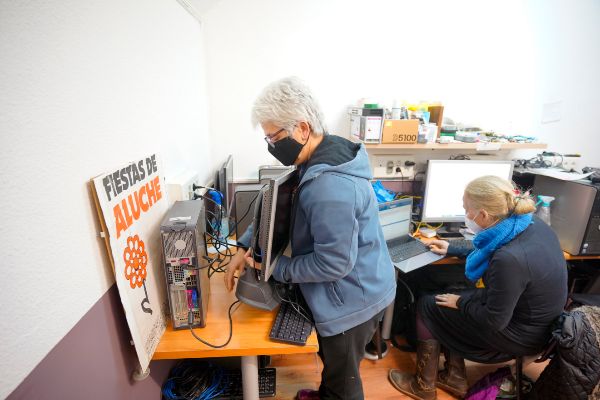Direct Latest news of the coronavirus
Madrid. The 'hunger queues' are growing: "With the 300 euros from ERTE we cannot eat"
When 650 needy families surrounded the headquarters of the Aluche Neighborhood Association in September to collect some food to eat, the association's workers and volunteers decided to
distribute a small questionnaire.
Do you have school-age children? How many? How many devices are there in the house? Do you have access to the Internet? And space for a desktop computer?
And with these questions,
the digital divide,
more pressing in the era of tele-education and telework,
came to light again
.
230 of these families from Aluche
did not have the necessary technological devices so that children could do their homework for school and upload them to virtual platforms.
Edgar, father of two boys aged 5 and 12, has had to watch his son constantly go down to the parlor to do his work these months.
Zurizaray, who is in the 1st year of high school, had to make
the presentations on the small screen of his mobile.
"It was a nightmare, in addition, the telephone did not work well and he was left hanging while he worked," he explains to this newspaper.
He also went to the library, "but with the confinement I stopped going."
"They need to have a computer. And I can't give it to them."
Both Edgar's son and Zurizaray, starting this week, will have their own computer with which to better continue their education.
"We saw that they were having many problems with education and that there was a technological need, so we decided to pass the questionnaire and get down to work," says Carmen, one of the association's workers.
The 110 desktop computers that the Aluches Neighborhood Association keeps in order to deliver to needy familiesÁNGEL NAVARRETE
Thanks to donations from the National Institute of Statistics, which has already given them
110 computers
, and the solidarity of the neighbors who have left them a place to keep the computers, little by little Marta and Adolfo, also workers of the association, are formatting the teams and preparing them to arrive at houses like Elizabeth's.
She was dedicated to cleaning, but now she has no fit.
Her husband charges an ERTE, but it is not enough to feed his four children and buy a computer so that the older ones, 15 and 16 years old, can do jobs.
On Saturdays he goes with his family to collect the food provided by the association, and this Thursday they have gone to get a computer.
"They would go down to the parlor, but they constantly need to have a computer.
And I can't give it to them," he
admits.
Verónica also has four children, two ages 14 and 16.
The work was done on her mobile phone or at her aunt's house,
who did have a computer.
"Yes or yes they needed a team, and they couldn't have it."
Now she works part-time, "but a computer is money I can't afford."
REVIEW ALL EQUIPMENT TO SOLVE FAULTS
"The 230 families who have requested a computer are in queues to collect food on Saturdays," Carmen recalls.
She is the one who keeps the list, organized by the age of the children:
Older than 12, from 12 to 10, up to 9.
"The latter, being the smallest, are the last to receive a computer," she explains tapping with your finger on that request block.
Some workers from the Aluche Neighborhood Association prepare the equipment to be delivered to the familiesÁNGEL NAVARRETE
Carmen is also the one who sometimes has to explain to families
how to connect the different cables.
"Before I had no idea, I have learned from this."
Yolanda has no "technology idea" either, but struggles to go up and down the towers and monitors to the room where Marta and Adolfo check the equipment.
Specifically, they check if the processor, graphics card, RAM fails ... and then they put free software on them.
"We bet on Debian, which adapts very well to old equipment and continues to be updated," Adolfo says by phone.
A job that takes a long time, in fact about ten computers are delivered every week and about 58 have been delivered, but it will allow children to
navigate, write, watch videos, enter virtual classrooms and some will even be able to make video calls.
"There is still a certain inequality, because they are computers that do not support the applications and current connection power, but it is the best we can offer right now to fight the digital divide in these families", concludes Adolfo.
According to the criteria of The Trust Project
Know more
See links of interest
News
TV programming
Translator
Madrid 2021 calendar
Madrid 2020 calendar
2021 business calendar
2020 business calendar
Topics
Fenerbahce Istanbul - Valencia Basket
Alcorcón - Girona
VfL Wolfsburg - SV Werder Bremen
Asvel Villeurbanne - Barça
Real Valladolid - Raise

